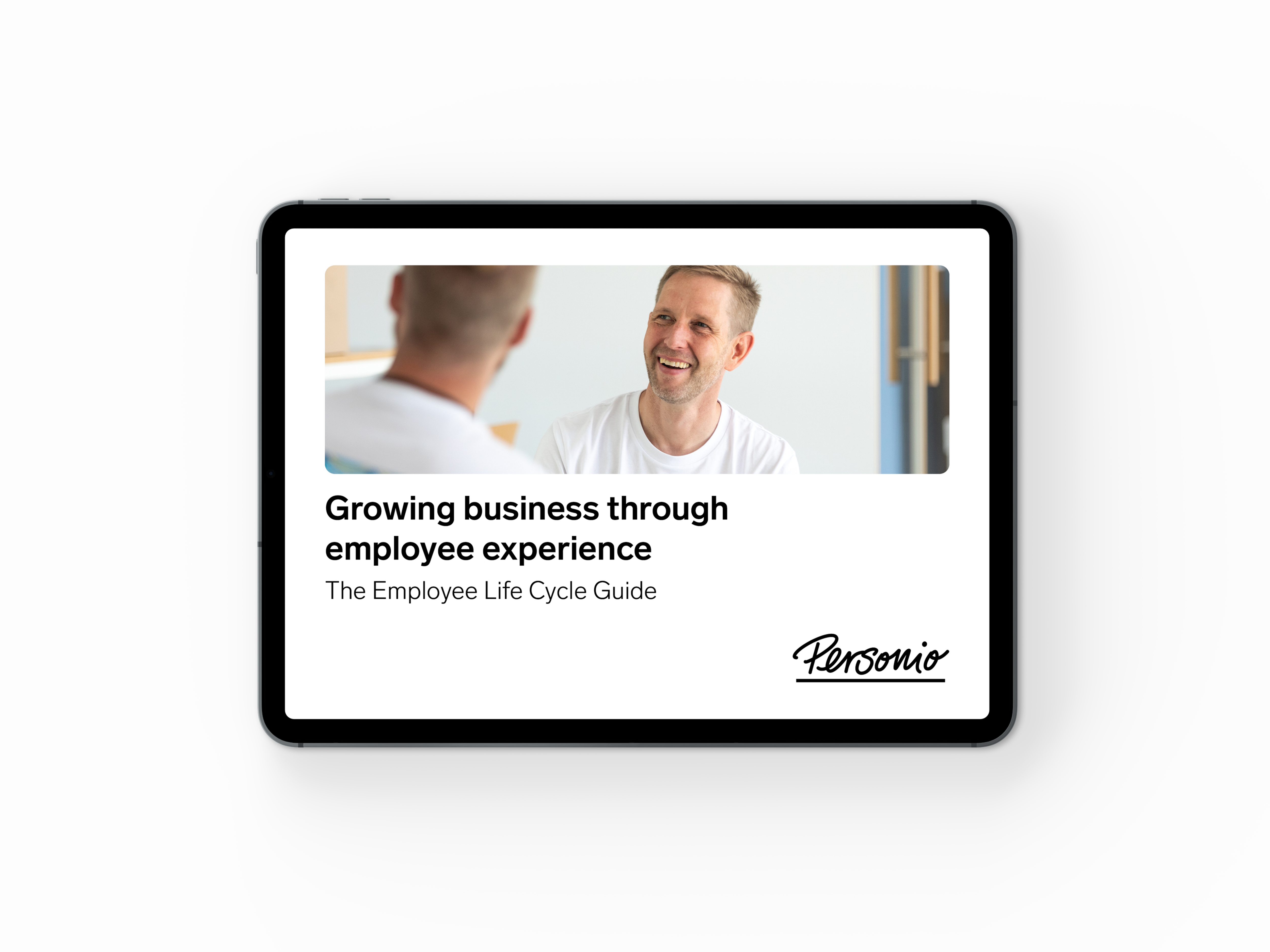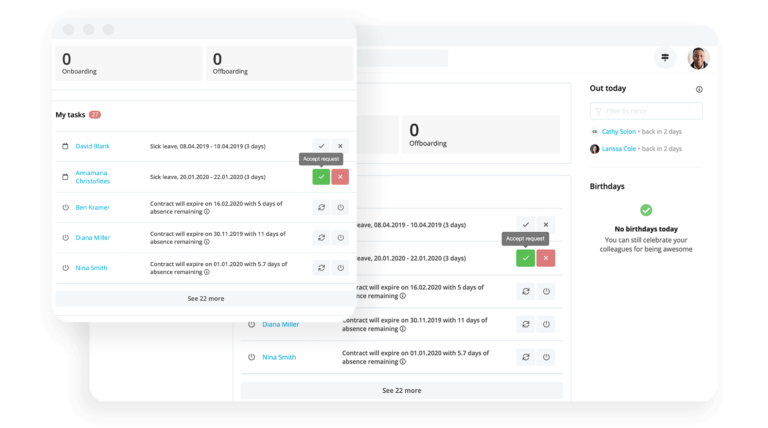HRIS Explained: Essential Guide for Businesses

What are you using to manage your HR work? The term HRIS stands for Human Resources Information System. An HRIS is a system or software used to collect, manage and run HR processes and programmes based on employee data.
From recruiting and onboarding to managing, developing and paying employees, think of it as marrying the power of IT with HR. In this article, we'll take you through how it works and how an HRIS can benefit your organisation.
Take a look at how Personio optimises every stage of the employee journey. Here's our guide.What is an HRIS?
A human resources information system (HRIS) is a system designed to manage everyday HR tasks, large-scale projects and general workforce management.
The top benefits of an HRIS software include time saved, more secure data, automated processes, more satisfied employees and an improved candidate experience.
The right HRIS software should offer a user-friendly interface, a wide range of features and a dedicated customer support and implementation team at the ready.
Key features and benefits of an HRIS
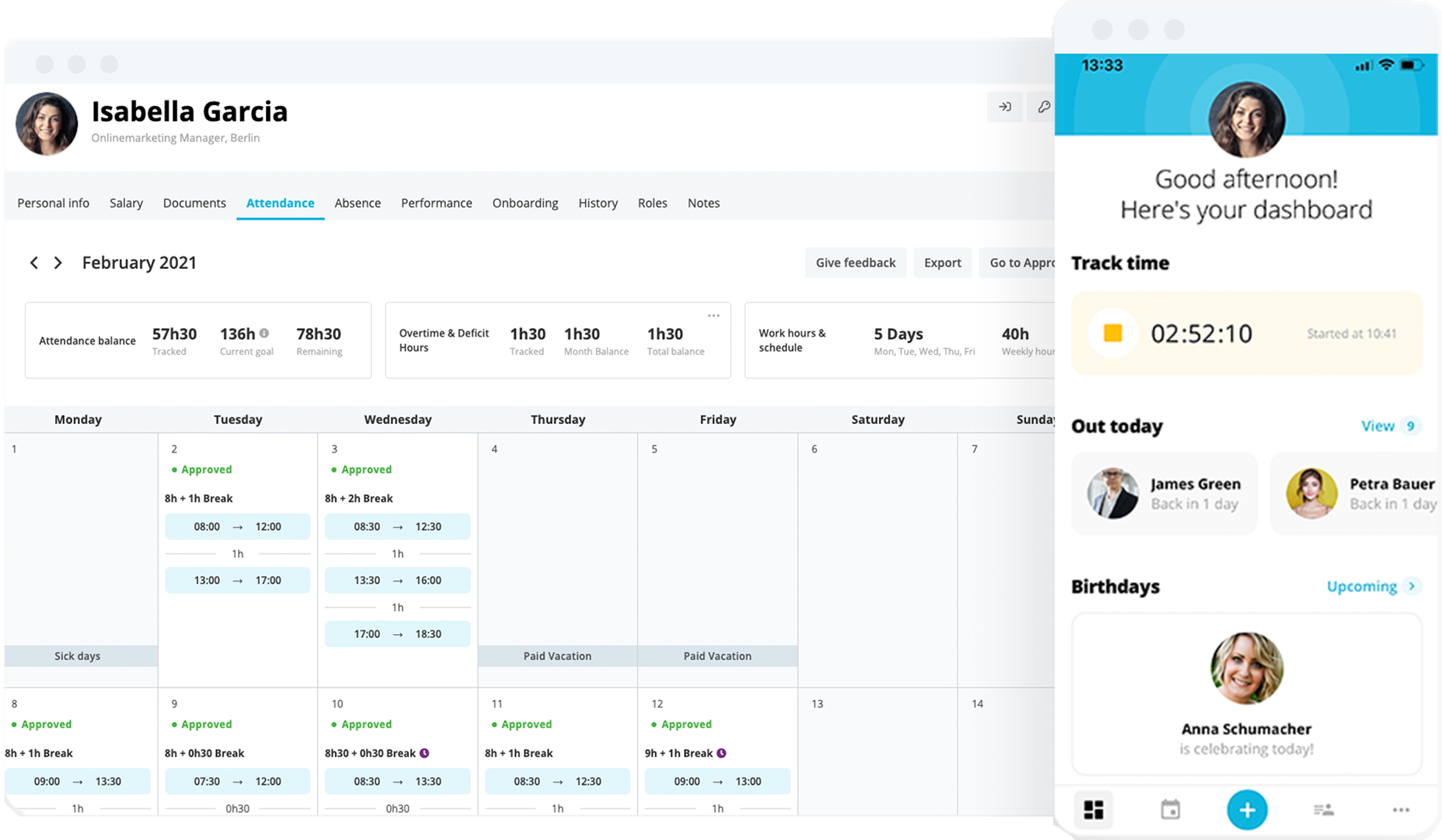
Most HRIS come with certain core HR-related competencies. This typically includes some high-level functionality, such as:
Function | Description |
|---|---|
Data management | HRIS provides a central repository for storing and managing employee information, making it easy to access and update records. |
Recruitment and onboarding | Streamlines the hiring process by managing job postings, applications, candidate tracking, and onboarding activities. |
Compliance and reporting | Generates reports for compliance with labour laws and regulations, reducing the risk of legal issues. |
Employee self-service | Allows employees to access and update their personal information, view pay slips, request leave, and more, enhancing their engagement and satisfaction. |
Analytics and decision-making | Provides insights through data analytics, helping HR professionals make informed decisions about workforce planning, talent management, and other strategic areas. |
Performance management | Facilitates performance reviews, goal setting, and tracking employee progress, helping to align individual performance with organisational objectives. |
Benefits of using an HRIS for teams
Many organisations will want an HRIS for different, competing reasons. Sometimes, it simply comes down to getting all of your ducks in a row. Other times, it offers the chance to focus your time on more important, people-related matters.
In any event, here are some of the top advantages of having an HRIS in your organisation:
Time savings
For instance, Personio saves HR teams up to 60 hours per month. When you have a great HRIS, your HR team spends less time entering information manually, struggling to generate reports, capturing signatures from people quickly and easily and saving time to focus on more strategic initiatives.
Clean databases
An HRIS can help keep teams organised by operating from one single source of truth. That means one set of information, easily accessible by all, to eliminate confusion and increase transparency.
Complete compliance
The right HRIS will be 100% compliant with European data standards (GDPR). After all, people in your organisation need to trust that their data is in safe hands — and HRIS software, when designed well and with the appropriate amount of diligence, can ensure this is the case.
Great candidate experiences
When an HRIS has a strong recruitment function, it can ensure that new employees have a great recruiting experience and a great onboarding. Your processes, productivity and culture all benefit, which, if you ask us, is reason enough to implement an HRIS right this second.
Data-based decisions
A great HRIS should be able to generate reports that educate your HR team, as well as your entire organisation. Easily-generated reports, created at the click of a button, can make this a reality.
Modern HR teams deserve a modern HRIS
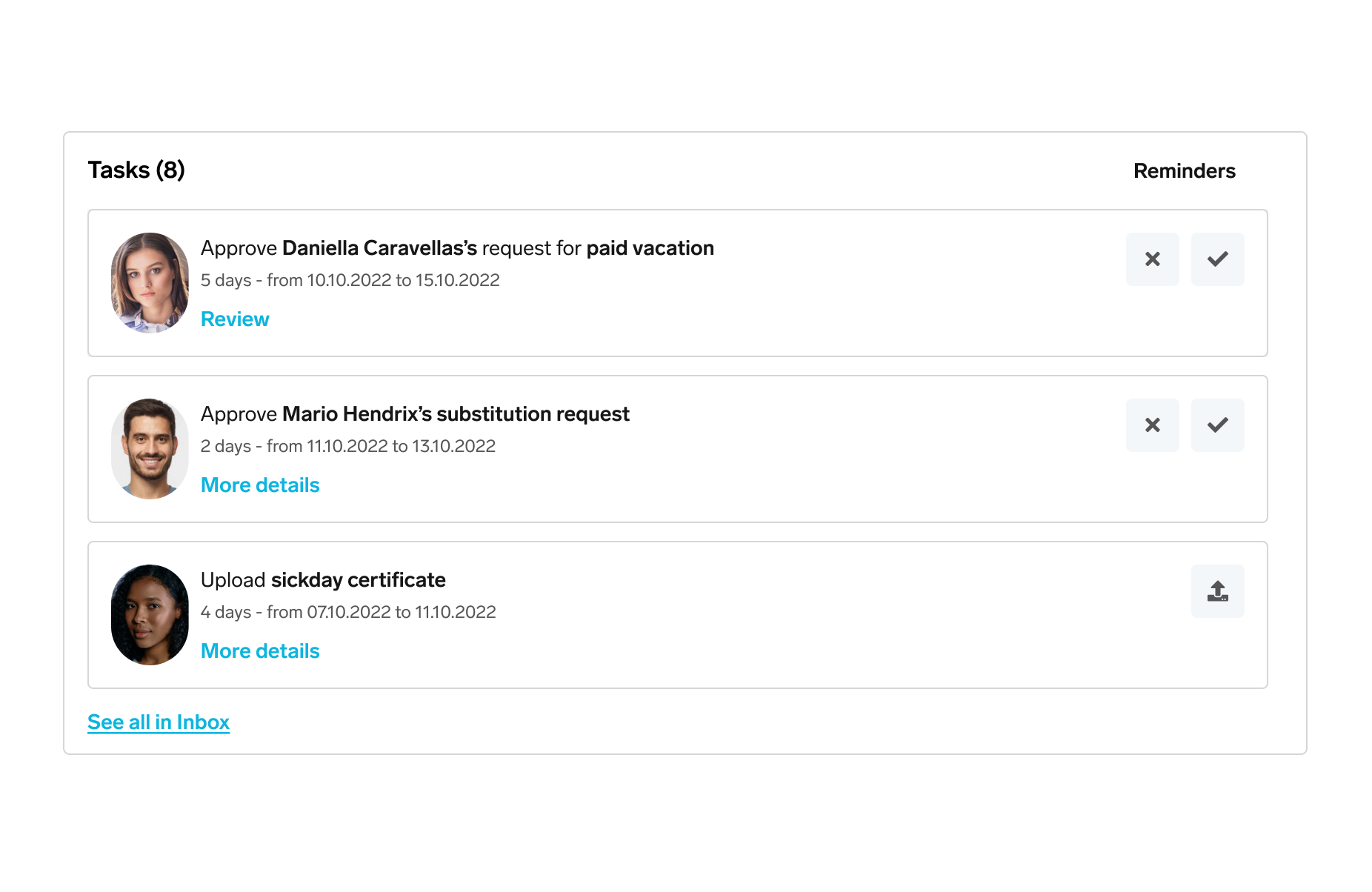
Trust Personio's all-in-one HRIS to help take your work to the next level. From one place, you can recruit, onboard, manage, develop and pay all your employees. Find out why 10,000+ companies trust Personio with their people work.
Here's how we helpHow to choose the right HRIS
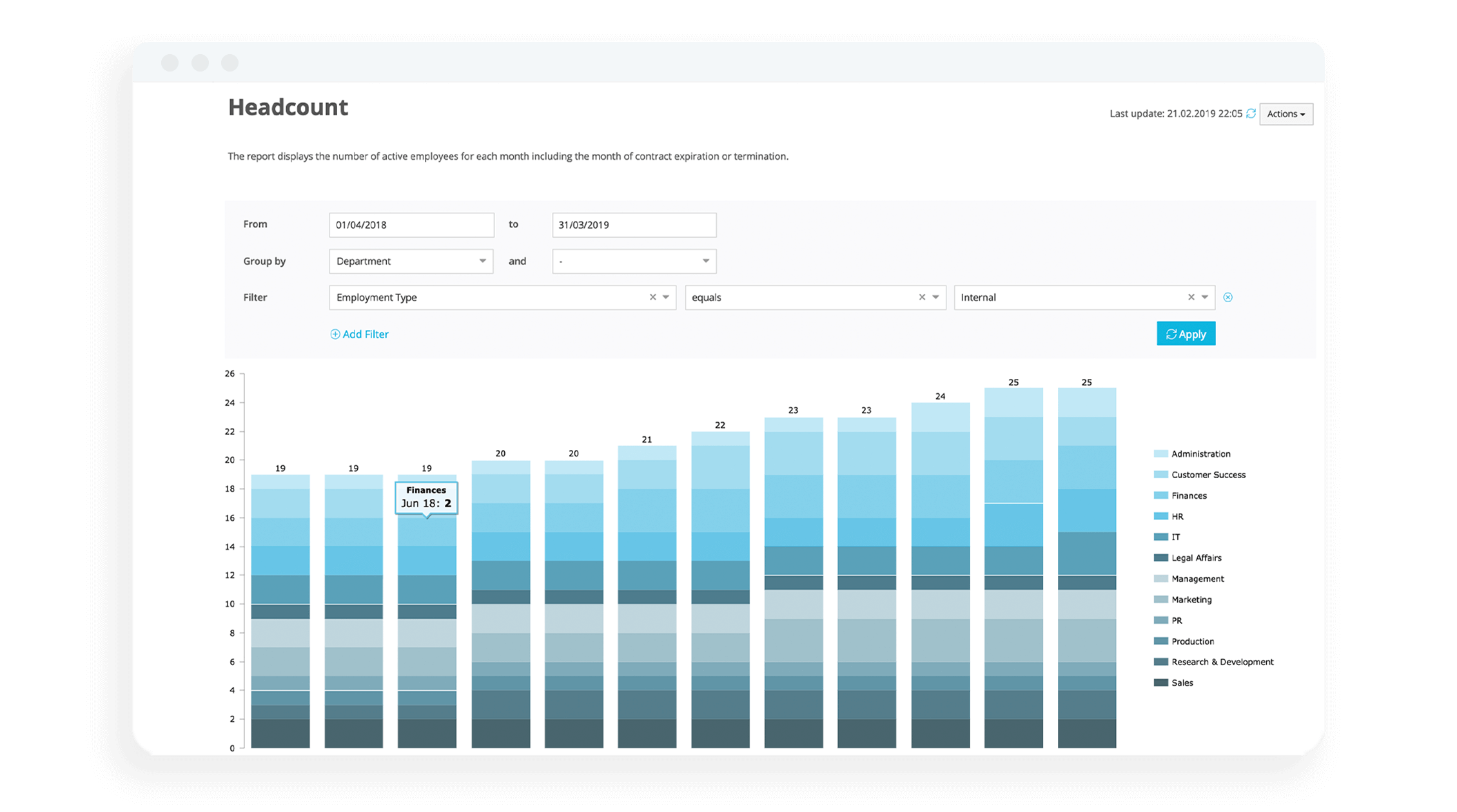
There are a handful of considerations that exist for teams choosing the ideal system for managing your HR data. These top-level considerations often include:
Data privacy | The storage of personal employee data is massive for organisations. How is your HRiS going to keep your data secure? |
Training and adoption | People need to know how to use your HRIS, and want to use it. Are you accounting for user-friendliness? |
Cost | Purchasing an HRIS is an investment. How much it costs is naturally going to come up. |
All of these considerations only make it more important that your team invests in the right solution. Below, we've provided five of the top questions you should ask when it comes to choosing the best HRIS for your organisation...
1. How big is your organisation and team?
The right HRIS is designed to do two things: Manage the needs of your current workforce while being able to project ahead and handle the needs of your teams years from now. You effectively need a solution that can future-proof your HR function.
This is especially true when it comes to the strategic role of scaling HR teams. If you want the time to focus on topics like salary benchmarking, diversity and inclusion or even more core processes like onboarding or performance, you need a solution that doesn’t need babysitting every time you add new employees.
So, how big is your team? At Personio, we focus on the needs of European SMEs who are trying to streamline and standardise their HR processes for peak performance. For us, we offer a customisable solution designed to meet the needs of small or medium-sized teams.
2. Are you trying to scale your teams and business?
Whether large or small, every organisation needs top talent. Therefore, recruitment is an essential part of any HRIS. This is not only true for sourcing great talent, but for ensuring a top candidate experience and recruiting journey.
If you are trying to grow your team, or meet your lofty hiring goals (whether quantitatively or qualitatively), you need an HRIS that can manage candidates, automate your responses (like confirmation emails for resumes) and store feedback from interview rounds and potential supervisors.
The greatest competitive advantage: An HRIS that can turn a candidate into an employee with one click. Within Personio, we try to make it easy by allowing candidates to sign contracts electronically while turning them into employees in a flash.
3. How important is development in your organisation?
What kind of weight does your organisation put on performance and development? A great HRIS not only focuses on storing data but on taking things to the next level when it comes to getting the absolute most out of your top talent.
In addition, it means your organisation doesn’t have to worry about purchasing, implementing and managing a solution for data and a solution for performance. Instead, you can have everything at once.
Performance with Personio looks like this: Automating your performance cycles, automatically reminding managers about performance talks and keeping feedback and goals in one place.
4. Which HR processes do you want to master?
As an HR function, there’s likely a whole host of processes that you want to focus on. So, you need a solution that can help you get started, optimise and master whatever you want to accomplish for your people.
That could be recruiting, onboarding, performance, payroll or anything in between. An all-in-one solution can ensure that you are able to tackle everything that you want while giving you the time back to approach each of these issues strategically.
5. What does your budget look like?
How much does it cost to invest in an HRIS? Speaking from our own experience at Personio, our HRIS is positioned around three types of plans: essential, professional and enterprise. The idea is to provide something that works for just about any organisation and billed on the number of employees that need to be managed, per month.
But, to really answer this question, we’d suggest visiting our guide to HR software pricing to learn a bit more about the investment and your return on using Personio.
Implementation of an HRIS
Implementing an HRIS is a strategic decision that transforms your organisation’s HR operations and employee experience.
Here’s our guide to help you navigate this process.
Planning and preparation
Effective implementation of an HRIS starts with thorough planning and preparation. This phase involves defining clear objectives, setting realistic timelines and allocating resources appropriately.
Data migration and testing
Data migration is a critical step in HRIS implementation, involving the transfer of existing employee and organisational data into the new system. This process must be handled with care to ensure data accuracy and integrity. It typically involves data cleaning, mapping, and validation to ensure the data fits well within the new system's structures.
Training and rollout
Training is essential to ensure that HR staff and employees can effectively use the new HRIS. Comprehensive training programs should be developed to cover all user levels, including administrators, managers and general staff. Training should be hands-on and include real-world scenarios to ensure users are comfortable with the system.
Best practices to get the most from your HRIS
Here are some best practices to ensure that you're getting the most out of your HRIS...
Regular updates and maintenance
Keeping your HRIS updated and well-maintained is crucial for securing data and enhancing functionality. Regular updates ensure that the system is protected against security vulnerabilities and is compliant with new laws and regulations.
Continuous training
Ongoing training is vital to maximise the benefits of an HRIS. As system updates and new features are introduced, continuous training ensures that users remain proficient in using the system. Regular training sessions can help reinforce best practices and introduce users to advanced features, ensuring the organization fully leverages the HRIS capabilities.
Leveraging analytics
HRIS analytics play a critical role in strategic HR management. By effectively leveraging analytics, organisations can gain insights into workforce trends, employee performance, and HR processes. HR professionals should be trained to interpret HRIS data accurately and to use this information to drive meaningful changes that align with business objectives.
A single system for your impact-driven organisations
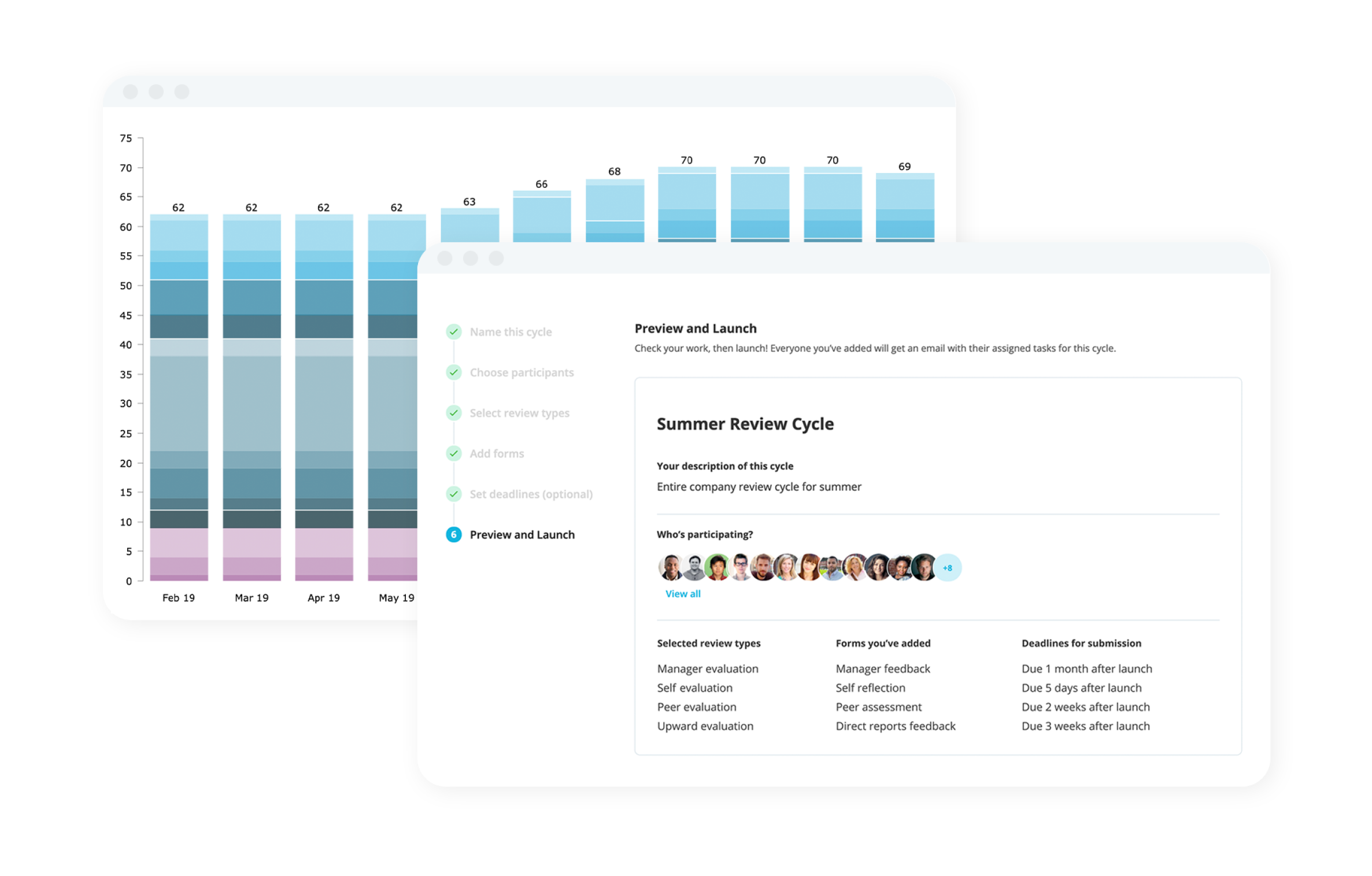
A great HRIS is not only built for your team today. It's built to help tackle your unique challenges now and into the future.
Personio is an HR software that serves each stage of the employee lifecycle. That means helping recruit, manage and develop your employees. And everything in between!
Speak to one of our product experts about our HRIS solution and implementing Personio in your organisation — for the benefit of your HR team — today.
HRIS: Frequently asked questions
What are must-have features for an HRIS system?
A robust HRIS system should include essential features such as employee database management for centralised record-keeping, recruitment and onboarding tools to streamline hiring processes, and automated payroll management to ensure accuracy and compliance.
Additionally, performance management features for conducting reviews and setting goals, time and attendance tracking, compliance reporting to meet legal requirements, employee self-service portals for personal information updates, and analytics and reporting tools for data-driven decision-making are crucial.
When is the right time to invest in HRIS?
The right time to invest in an HRIS is when your organisation experiences growth that makes manual HR processes inefficient and error-prone.
Indicators include increased employee headcount, the need for more streamlined recruitment and onboarding processes, challenges in managing payroll and benefits accurately and the necessity for compliance with complex labour laws.
If your HR team is spending too much time on administrative tasks rather than strategic initiatives, it’s a clear sign that an HRIS could add significant value.
Are there different types of HRIS systems?
Yes, there are different types of HRIS systems tailored to specific organisational needs.
These include basic HRIS for small businesses focusing on core HR functions, comprehensive HRMS (Human Resource Management Systems) that integrate payroll, benefits, and performance management, and strategic HRIS which include advanced analytics and workforce planning tools.
Additionally, specialized HRIS platforms may focus on specific aspects such as talent management or learning and development. The choice of system depends on the size, complexity, and specific HR goals of the organization.
